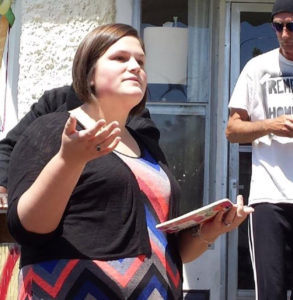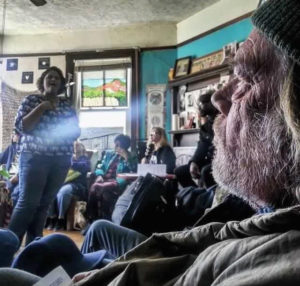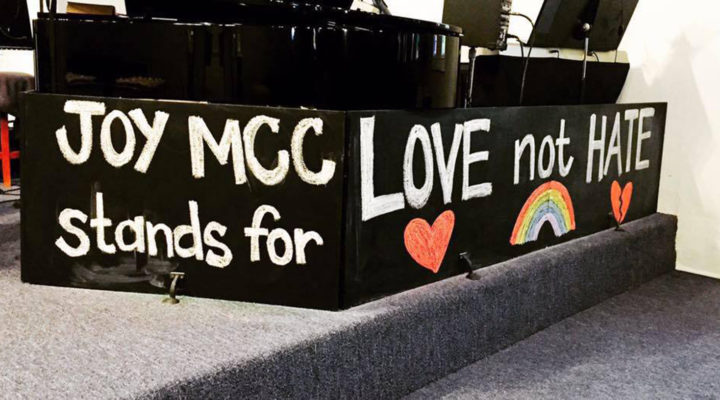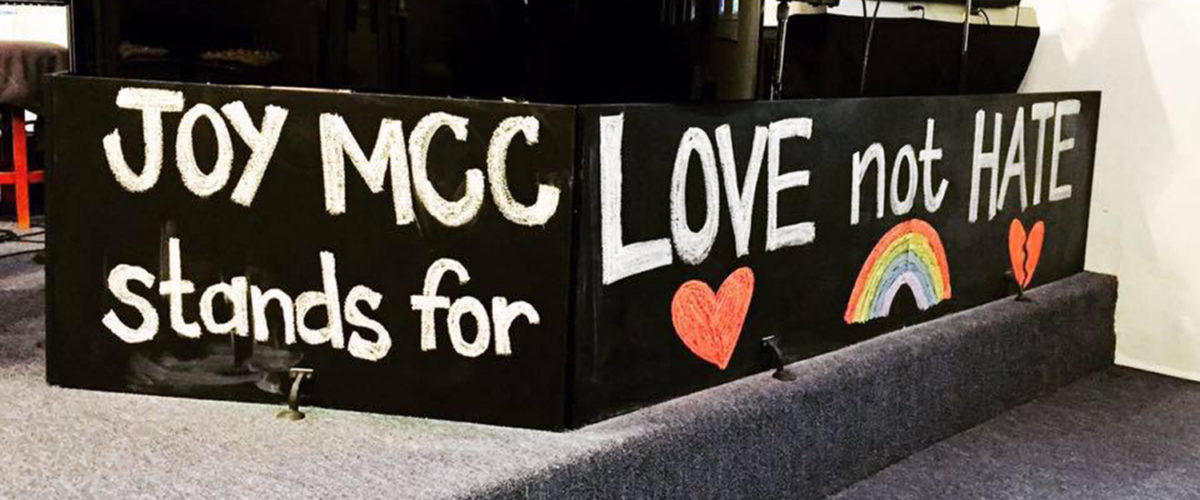Megan Currie was set to preach her first Sunday sermon June 12 at Joy Metropolitan Community Church in Orlando, where she is serving as a summer intern. But a gunman’s murderous rampage, just over a mile away, kept her out of the pulpit that morning.
“I was going to preach about how the prodigal son goes off to a distant land,” said Currie, 21.
Instead the church became a staging area and spiritual refuge for friends, family and survivors of the mass killing at Pulse, an LGBTQ night club.
It wasn’t the first time Currie’s plans have been interrupted by prejudice. Another was after first hearing a call to ministry while attending high school in Indian Trail, N.C.

During her four years at Mars Hill University, Megan Currie participated in a variety of ministries, including to the area’s LGBT community. (Photo courtesy/Megan Currie)
“I grew up in a Southern Baptist church and was told I couldn’t minister [as a woman] unless I work with children,” said Currie. “It was hard to feel called and rejected at the same time, so I said I’m not going to do it.”
But at Mars Hill University in western North Carolina, from where she graduated in May, Currie met Stephanie McLeskey, a campus chaplain endorsed by the Cooperative Baptist Fellowship. With McLeskey’s guidance, Currie blossomed into a campus leader and organizer who served internships at two CBF churches and embraced homeless and LGBTQ ministry.
Since the Pulse shooting, Currie’s written words have been used at vigils in Asheville, N.C., and at Mars Hill, a school with historic Baptist ties. McLeskey said the arc of Currie’s spiritual development, compassion and calling to LGBTQ ministry make her the ideal person to join the staff of Joy Metropolitan Community Church. The MCC is a Protestant denomination with a specific outreach to lesbian, gay, bisexual, and transgender families and communities.
“In my view it’s providential,” McLeskey said.
“She is stronger even than we imagined and her words carry such weight and love in the face of such hate and fear,” she said.
Currie, who begins studies this fall at Mercer University’s McAfee School of Theology, told Baptist News Global that her life over the past week, like all members of her church, has been “crazy.”
“In four days we have had four different worship services and we’ve planned vigils and prayer services and I have been part of helping that run smoothly,” she said.
Currie was rescheduled to preach yesterday. The week before she set aside time to answer several questions from BNG.
Does it feel like you’ve been thrust into a chaplaincy role at Joy MCC?
We have had the survivors of the shooting in and out of church and we have had a crisis counselor here with us. We have all been a support in some way. … I am learning that not only do we have to run a church and focus on the everyday needs of church, we also have to be in support of the people who were so deeply affected by the shooting. … Nobody on staff has ever been part of ministering to people after a mass shooting.
How did you learn of the shooting at Pulse?
I’m a news junkie and I have the CNN app on my phone. … I woke up around 6 o’clock that morning to get up and prepare and look over my sermon and I looked at my phone and saw there had been a shooting in Orlando at a gay nightclub. … Then we realized how close it was to the church. Our congregation is primarily LGBT people, and we knew instantly people in our congregation would be affected.
What were your initial feelings?

Megan Currie said she learned many of the skills she’s using in Orlando during internships in North Carolina. (Photo courtesy/Megan Currie)
I can’t say I was emotional at first. … We knew we had to get two services done and I just focused on what had to be done that day. … I don’t think it hit me until Sunday evening what had happened.
In what way did it hit you?
In the middle of the service a Latino man walked in and said he was a victim. He was still wearing his hospital bracelet. He said he wanted to tell his story about what happened. He was held hostage in a bathroom. … His initial gut response was just to play dead and the shooter just assumed he was dead. … And I think that’s when it hit me, when I was face to face with someone who had been so deeply affected.
Did your prior internships help you with your present ministry?
I learned a lot about what it means to sit with someone in their grief. It seemed in my first and second summers there was a lot of grief going on. I constantly had to learn to be that calming presence and support for someone who’s grieving. That for sure has prepared me for this … and it taught me how to effectively preach and teach by serving at First Baptist Church in Monroe, N.C., and First Baptist Church in Asheville.
What are the biggest challenges in LGBT ministry?
I don’t know that there are any [unique] challenges. People who are on the left often say that working in an inclusive church must be easy. I can’t say that because any church has its challenges. … Christians on the right assume gays and lesbians can’t be Christian.
Do a lot of gays and lesbians share that assumption, too?
When people first come to Joy, they are confused because they are loved and celebrated and we tell them we want you to be all of who call you to be. … It’s so different from what they have been taught all their lives. They have to go through this moment of how can I be gay and be loved by God?
What kinds of questions has your community been asking since the shooting?
They’ve been asking, why does it have to be our people? Their hearts are broken and my heart is broken for them and … I’ve seen their tears as they look at Facebook and at the news … about how gays deserve this and gay people reap what they sow. … But they have been going to [the Metropolitan Community Church] long enough to know they are loved by God … and that there isn’t anything that can separate them from God’s love.
What kind of questions have you been asking?
I question everything. I really like answers and I never get an answer for anything. I’ve had plenty of questions this week. Sunday morning we were trying to comfort people and we found it fitting to sing It Is Well with My Soul and that just made me angry because this horrible thing that has happened is not well with our souls — yet. … And I have been having a lot of anger toward Christians on the right this week because they played a part in the allowing the hatred to continue, even after the shooting. They continue to slam and push down an already marginalized community, and that’s not what Jesus would do.
Do you feel called to be in Orlando right now?
I always struggle with discerning where to be and I’m always praying God will make it clear I am in the right place at the right time. Sunday morning it was clear. I’m grateful to be among people who show me and remind what the church is a really about, which is grace and mercy.
What will you preach about on Sunday, June 19?
I am still going to preach about that distant country. I try to make my sermons LGBT-friendly here, so it will be about how they are trapped in a distant country when they are in a closet, when they feel trapped and hide who they are.


